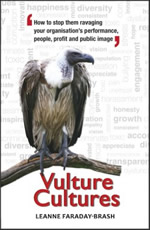skip to main |
skip to sidebar

Search This Blog
Leanne Faraday Brash

About Me
- LFB
- Welcome to my blog. I am an organisational psychologist, executive coach, speaker and facilitator. I am Principal of Brash Consulting and co-founder of the Workplace Justice Consortium. Working with my clients I both empathise and provoke to ensure clients develop self-awareness, acknowledge and 'own' their behavioural choices and act with self-responsibility around promises and agreed goals in order to provide better leadership for their people. My training and experience means I understand the psychology of motivation and what needs to be in place for people to follow through and enact set goals. I am obsessed with the difference between 'wishful intent' and 'true intent' and believe the only way we really demonstrate true intent is through our actions. Whilst I consult in a range of areas including workplace justice, change and leadership, the common thread is creating a safe and supportive work climate that fosters innovation, high performance, job satisfaction and emotional wellbeing.
Getting in Touch
What's Going On?
I'm thrilled to announce my book Vulture Cultures: How to stop them ravaging your organisation’s performance, people, profit and public image is now on sale!
In the book I draw on 20 years consulting experience to provide a compelling account of toxic workplace cultures, how they grab hold against all common sense and importantly, how to eradicate them.
For more information and to buy a copy visit Vulture Cultures
If you would like to access tips, tools and articles, visit our website at http://www.brashconsulting.com.au/
In the book I draw on 20 years consulting experience to provide a compelling account of toxic workplace cultures, how they grab hold against all common sense and importantly, how to eradicate them.
For more information and to buy a copy visit Vulture Cultures
If you would like to access tips, tools and articles, visit our website at http://www.brashconsulting.com.au/

